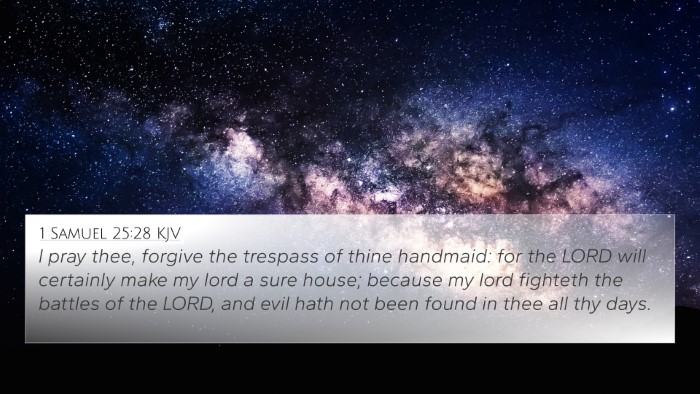Understanding 1 Kings 2:24
The verse 1 Kings 2:24 states, "Now therefore, as the Lord lives, who has established me and set me on the throne of David my father, and who has made me a house, as He promised, Adonijah shall be put to death today." This verse encapsulates King Solomon’s decisive action against Adonijah, reflecting themes of authority, divine endorsement, and the fulfillment of God's promises.
Summary of Insights from Public Domain Commentaries
-
Matthew Henry emphasizes the significance of Solomon's royal authority, highlighting how his kingship is confirmed by God. He points out that the act against Adonijah was not merely political but a matter of upholding justice and securing the throne established by God.
-
Albert Barnes notes Solomon’s explicit invocation of the Lord's name, indicating a strong reliance on divine authority in his actions. Barnes draws attention to how this act serves as a foundation for Solomon’s rule, establishing the seriousness of rebellion against God’s anointed king.
-
Adam Clarke provides an analysis of the context leading to this moment, suggesting that Adonijah's previous attempts to claim the throne created an atmosphere of tension. Clarke argues that Solomon’s response is not only a consolidation of power but also a necessity for maintaining order within Israel.
Thematic Connections and Comparative Bible Verse Analysis
This verse resonates with several other biblical texts, showcasing the recurring themes of divine authority, the fulfillment of God’s promises, and the necessity of divine justice.
Cross-References for 1 Kings 2:24
- 2 Samuel 7:12-13: God's promise to David about his lineage and the establishment of his throne parallels Solomon's claim of divine backing.
- 1 Kings 1:5-7: The previous attempt by Adonijah to declare himself king reflects the tumultuous backdrop of Solomon's reign.
- Psalm 89:3-4: Assurance of God's covenant with David reinforces the legitimacy of Solomon’s reign.
- Proverbs 16:10: The concept of kings speaking justly attests to the righteousness expected from Solomon as king.
- Matthew 5:25: The importance of reconciliation and justice serves as a thematic link to Solomon's decisive actions against those who rebel.
- Romans 13:1: The principle of governing authorities instituted by God parallels Solomon's divinely appointed leadership.
- 1 Chronicles 22:9-10: Another confirmation of God's choice of Solomon as the heir signifies the importance of divine election in leadership roles.
Interpretation and Application
The verse serves as a reminder of the serious nature of God’s covenant and the call for justice within leadership. The fulfillment of God’s promises brings reassurance to believers, while Solomon's actions illustrate the consequences of rebellion against God’s divine order.
As we explore Bible verse connections, this passage encourages prayerful reflection on the authority in our lives and how we respond to challenges within our spiritual journey.
Utilizing Tools for Bible Cross-Referencing
Understanding the interconnectedness of Scriptures can enrich one’s study and application of Biblical principles. Consider tools such as a Bible concordance and a Bible cross-reference guide for deeper insights into connections and themes that echo throughout the Word of God. These resources can enhance your cross-reference Bible study, allowing you to draw more profound understanding from comparative Bible verse analysis.
Engaging with cross-referencing Biblical texts is crucial for identifying relationships between Scripture. This can be particularly valuable for pastors preparing sermons or individuals seeking a richer understanding of specific theological themes.
Conclusion
1 Kings 2:24 serves as a pivotal moment in Israel's history that emphasizes the weight of divine authority and the importance of maintaining justice in leadership. As believers study this verse, they are invited to explore the broader inter-Biblical dialogue, engage in cross-referencing Bible study methods, and meditate on the implications of divine rulership in their own lives.


















